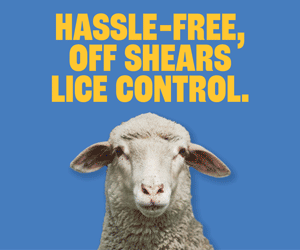
NZ Merino CEO Angus Street at LambEx.
BRAND enquiry for ethical and sustainable wool is high, though yet to transfer into new sales from leading suppliers like NZ Merino Company, but there is a message for Australian growers in the underpinning consumer and regulatory trends.
After speaking at the LambEx conference in Adelaide last week, NZ Merino chief executive officer Angus Street said over the next 12-18 months he expected NZ Merino’s existing and new brands to work through inventories ‘over-ordered’ during COVID.
“At that point, if it aligns nicely with some pressure relief from an inflationary point of view and consumer spending spikes, I think in the (next) 12-18 months it’s fair to say that ethical and sustainable wool is going to be an amazing position to take advantage of suddenly more dollars in consumers’ wallets and their desires to spend on ethical and sustainable garments.”
Mr Street said brands are also positioning themselves to meet the requirements of EU and other global regulations around sustainability, welfare, garment and material fibre content, traceability and product passports.
His message for Australian wool growers generally was that the wool market generally in 12-18 month’s time would be in a vastly different place, but the value the market placed on non-certified versus on certified or non-mulesed wool might vary when global economic conditions improve.
 “If you as a grower have the production system and are prepared to do the investment to get your clip certified, what that does is put you in a position to get access to higher returns for your clip and new demand,” he said.
“If you as a grower have the production system and are prepared to do the investment to get your clip certified, what that does is put you in a position to get access to higher returns for your clip and new demand,” he said.
“Wool is going to be sold, the question is for what value and so if you are comfortable as a grower to grow wool and take the price then you will clear wool – there will always be a place for wool.
“The choice as I said in my presentation, is do you take a leading or growth mindset and actually look at the opportunities that are being created,” he said.
“Yes it takes investment and a willingness to change, but all of this sustainability change, if done properly, can give you profitable returns and that’s our mindset – don’t do it unless it gives you profitable returns, the model does.”
Mr Street told Sheep Central that NZ Merino is forecasting a FY 2024 loss at net profit after tax level in the range of $3.2-$4.3million due to economic impacts on the company’s brand customers.
But in explaining the reasons for the loss forecast, Mr Street sees brighter days ahead for wool growers prepared to invest in ethical and sustainable production practices as brands position themselves to meet consumer expectations and garment material regulations.
“The biggest driver for the forecast loss has been post-COVID impacts on our brand partners and supply chains.
“It’s very closely tied to the over-forecasts of consumer demand by or brand partners.”
Inventories full, but contracted growers OK
Depending on the segment, the brand partners have either garments or wool in stock, he said.
“So for us, because we have long-term contracts with growers and brand partners, we are honouring all of the grower contracts at the prices on signing.
The grower contracts are over, three, five or year cycles, insulating to varying extents, Australian wool producers contracted to NZ Merino,” Mr Street said.
“Anybody who has a contract is significantly in front of the current market.
“For us, as a business to add more value, we need to get more of our growers’ clips into contracts,” he said.
Mr Street said typically, a brand partner won’t put 100 percent of their forecasted wool requirements into a contract.
“They will contract a portion and then during the year, depending on demand, they top up.
“And so, what we are seeing is that instead of having 80-90pc of the grower’s wool clips into contracts, those contracts and top-up extensions are not there, because there is so much wool in the supply chain,” he said.
“The biggest impact is that consumer spending is down, so what we are seeing is now the percentage of wool in contracts is on average 50-60pc.”
New enquiry for ethical and sustainable wool at high levels
Mr Street said NZ Merino growers have been impacted by the slowdown in consumer demand, but those with contracts have significantly benefited from them.
However, Mr Street said enquiry for the company’s ethical (ZQ) and regenerative (RX) certified wools – crossbred and Merino — from new brands in the last six months has been at some of the highest levels ever seen.
“However, the conversion of those enquiries into sale that we can turn into grower contracts isn’t there … and price is not the issue.”
The brands are coming out of a period of an extremely volatile spending pattern, he said.
“They don’t have a concrete forecast for them to put orders into.”
These new brands shifting to buy ethical and regenerative certified wool would like to buy, but they already have wool/garments in stock, he said.
Mr Street said the brands have to move through the inventory of wool purchased outside of the ethical and sustainable channels and they have to have confidence in consumer spending forecasts.
“Non-mulesed (wool) is almost table stakes, it’s an expectation from existing and new brands.”
Mr Street said the existing and new brands are coming to NZ Merino because of changing consumer expectations.
Value and quality are the two main drivers, but consumers are asking for provenance, traceability, trust and sustainability credentials, he said.
“I would still say that a lot of existing brands that we supply, and new brands, are unsure around the impact of how regulation is going to impact them.
He said the brands are preparing themselves to deal with the coming regulations.
“And they see ZQ and RX as a solution to meet whatever may come at them.”
Mr Street said some of the proposed regulations impose a tax or a fine for non-compliance.
“They (the brands) are gearing themselves up at the same time as the consumers will hopefully have more dollars and cents.”
Wool is in an exciting space
NZ Merino contracts a large proportion of its certified non-mulesed Merino wool through AWN and other brokers and Mr Street believes the company will need more certified wool from Australia when demand recovers in 12-18 months.
“I think wool as a category is in a really exciting space.
“We’ve talked regulation and consumer sentiments around sustainability, there is the big trend to natural fibres away from plastics,” he said.
“We see it because we are transacting it, but it is not at the scale that is going to shift the dial (of grower price) in the short term,” he said.
“Because end brands are wanting more from wool, in quality from the natural fibre.”
However, on the issue of wool garment sales being linked to the price of comparative non-wool products, Mr Street said NZ Merino – marketing wool from 12-35 micron — is seeing an increasing lack of correlation for some wool types into some market segments.
“At a scale perspective, I think we’ve got to wait a few years.”
He said the fashion industry is leading the charge.
“I think slowly the consideration of ethical and sustainable sourcing, carbon and biodiversity that we are seeing in fashion and apparel segments is starting to roll into textiles and furnishings …. but these (segments) are probably 5-6 years behind.”
In its latest earnings guidance, NZMC said it had completed a thorough strategic review to examine its efficiency and vulnerability to market fluctuations.
The company has established a profitability improvement workstream it said will have an incremental impact over the next 12 months. NZMC said it will also commence several projects to drive sales and efficiencies as it aims to strengthen the business for its next growth phase.
The company said it remains focused on delivering value through the supply chain from grower to brand partner. It will concentrate on expanding its globally recognised branded fibre positioning, and developing world-class ethical and regenerative integrity systems that support that positioning.

HAVE YOUR SAY